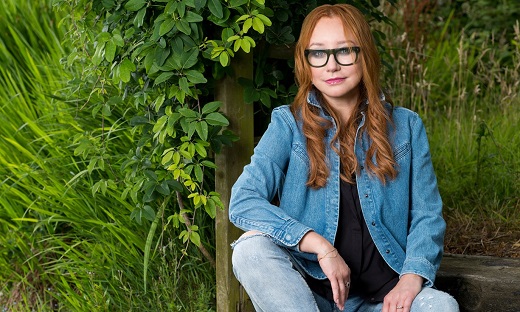|

songs | interviews | photos | tours | boots | press releases | timeline
The Guardian (UK)
Monday, September 19, 2016

Audrie and Daisy: an unflinching account of high-school sexual assault
The upcoming Netflix documentary by husband-and-wife film-makers Bonni Cohen and Jon Shenk exposes the shame and bullying that teenagers endure online
by Nosheen Iqbal
photo by Des Wellie/Netflix
Daisy Coleman was 14 when she was found by her mother, unconscious on her front porch in the snow. She was wearing just a T-shirt and leggings; her hair was frozen to the ground. The evening before, she and her best friend Paige Parkhurst, then 13, had been hanging out with 17-year-old Matthew Barnett and his friends, in his parents' basement. What happened that night became a story that rocked Maryville, a small manufacturing town in the midwest, for months. Daisy was, by her account if not by the state of Missouri's definition, raped. She says she had been too drunk to consent and blacked out an entire portion of the evening, when high-school football star Barnett claimed they had consensual sex. Paige was, in fact, raped; her 15-year-old unidentified attacker pleaded guilty in juvenile court. The families of both girls have endured a sustained campaign of abuse online since the story broke in 2012. The Colemans had their house burnt down, mutilated dead rabbits were dumped in Parkhurst's car.
For husband and wife film-making team Bonni Cohen and Jon Shenk, Daisy's story became depressingly familiar. "We had heard about these worst-case scenarios about high schools," says Jon, "where quite young girls were being assaulted by people they thought were their friends and then bullied online about it, when the perpetrators took video and pictures." One such case from the same year was that of Audrie Pott. The Californian 15-year-old had woken up at a house party, without her clothes on and her body covered in marker pen. Boys she had known since middle school sexually assaulted her while she was drunk and had passed out; photos of the incident circulated throughout the school. Eight days later, Pott killed herself.
"The most surprising thing is the similarities," says Cohen. "That's why we wanted to tell a story in the suburb of San Francisco and in rural Missouri. Even though they're worlds apart in terms of where they are in the country and the kinds of lives they are leading, when it came to these cases they were eerily similar. It was extremely surprising to us that this kind of behaviour is happening no matter where you live." Their film, Audrie and Daisy, is a stark, unflinching account of high-school sexual assault and trial by social media.
Tori Amos, who wrote and recorded the film's title track, "Flicker", says she felt compelled to become involved in the project. Amos was raped when she was 21, after playing a gig in a Los Angeles bar, and has been an activist for anti-sexual violence charity RAINN for 20 years. "I'm not sure there is more sexual violence against young women now, but the additional shame and bullying teenagers suffer through social media is still shocking." Like the filmmakers, Amos has a teenage daughter. "There is a lot of conversation about pressures young girls face in the way they look these days -- what does that have to do with being stripped naked and degraded and assaulted by boys you've known your whole life? Why isn't there more emphasis on the conversation we need to have with young men?"
"Ironically," says Shenk, "we're living in an age where people are more aware of sexual assault, but I don't believe that we're living in an age where there is more sexual assault." Both he and Cohen are set to do "hundreds and hundreds of community screenings, school screenings, campus screenings all over the world". Neither have any fast answers on how to tackle the problem. "We need to band together to figure out how to stop this," says Cohen. "This is in our hands, this is happening in our households, under our roof, with parents sometimes at home."
Audrie and Daisy is available to watch on Netflix from 23 September.
[source]
t o r i p h o r i a
tori amos digital archive
yessaid.com
|